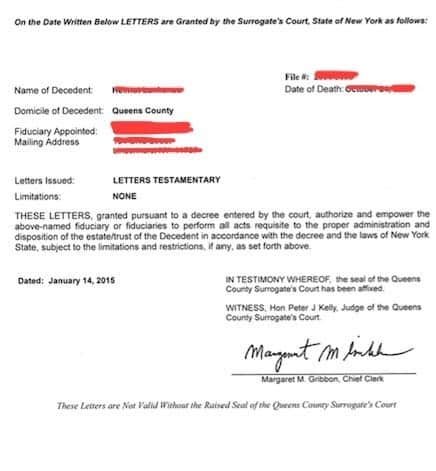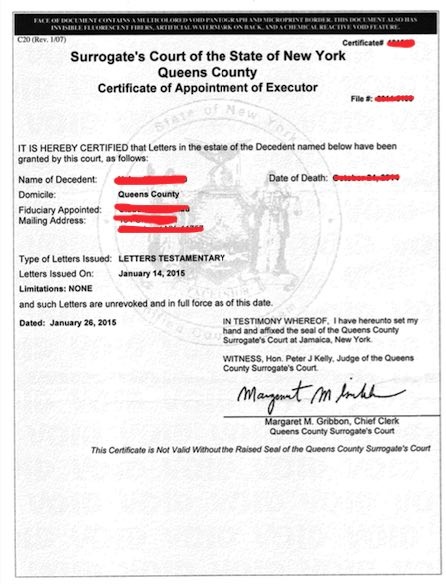Letters Testamentary in New York City: What Are They And How to Get Them
New York Letters Testamentary is a document issued by the Surrogate’s Court that enables you to act on behalf of an estate of a person who died with a will.
Here is a redacted image of Letters Testamentary obtained by our law firm:

Letters Testamentary are Not a Letter
The document, Letters Testamentary, is not a letter in the common sense of the word. In legal usage, the word “letters” means something along the lines of “Mandate, Authorization and Order.”
What follows is that a lawyer cannot issue letters of administration for you. The only thing a lawyer can do is to represent you in the process of obtaining the Letters Testamentary from the court.
If you are looking for an attorney who can represent you in getting New York letters testamentary, you can send us an email at [email protected] or call us at 212-233-1233.
Do I Actually Need Letters Testamentary?
You cannot act as the executor until the court issues Letters Testamentary. Only then can you collect the assets of the estate, pay the estate’s debts and expenses and distribute the remainder to the estate’s beneficiaries.
What Letters Testamentary Allow You to Do
Letters Testamentary authorize a person to act as a representative of an estate. They allow a person to perform the responsibilities of an estate.
Here are some of the powers that the executor has once they are appointed as an executor of an estate by Letters Testamentary issued by the Surrogate’s Court:
- Obtain a tax id number for an estate from the federal government
- Open an estate bank account
- Request information from banks and other institutions that control the decedent’s assets. The banks will comply if you show them the Letters Testamentary and the death certificate
- Transfer assets from the decedent’s name to the name of the estate
- Pay debts of the decedent
- Collect claims of the decedent
- Marshal assets of the estate
- Distribute the estate assets to the beneficiaries of the estate, after obtaining proper waivers or providing an accounting
Those things would be impossible to do without New York Letters Testamentary. The banks will not give you information and will not transfer the money in the bank accounts, the county recorder will not record property deeds, and a buyer will not buy a property from you.
How to Get Letters Testamentary
In order to get letters testamentary, you need to submit a petition for probate together with its supporting documents to the Surrogate’s Court.
Here are the documents you will need:
-
Petition for probate
- The probate petition will require information about the decedent, the executor, beneficiaries of the will, close of kin of the decedent, size of the estate,
- An estimate of the gross estate of the decedent passing by will, separately showing the values of personal and real property, gross rents for a period of 18 months, and information about any cause of action for personal injury or death
- Original death certificate
-
Original will
- Do not unstaple even if you are scanning it.
-
Affidavit of Comparison
- Executed by a disinterested person stating that they have reviewed a copy of the will and that it is the same as the original will being submitted
- May be waived by the court
-
Waiver of Process, Consent to Probate
- Executed by the heirs of the decedent – those who stand to inherit if there was no will
- Heirs still need to execute this document, even if they are excluded/omitted from the will and not listed as a beneficiary
- If you cannot get waivers from all the heirs, you will need to get a citation from the court.
-
Citation
- Issued by the court to those heirs who do not execute waivers
-
Notice of Probate
- Issued to all beneficiaries listed in the will
-
Filing fee
- Ranging from $215 to $1250 depending on the size of the estate
- The exact fee can be computed by cross-referencing Surrogate’s Court Procedure Act § 2402
-
Proposed Decree
- Proposed order to be signed by the Surrogate, granting the nominated executor Letters Testamentary
-
Affidavit of Heirship
- An affidavit of heirship needs to be executed by a disinterested person when the decedent was survived by no heir, one heir, or where the surviving heirs are related to the decedent through a person who is also deceased.
- Family Tree
Make sure that you submit a complete set of documents to the court. Failure to submit complete documents will result to delays in the issuance of Letters Testamentary. With delay, you will not be able to immediately perform your duties as executor and you cannot marshall and collect the assets of the decedent. You will not be able to take hold of bank accounts or sell real estate belonging to decedent.
Although a petition for probate can be done pro se (by yourself), delay may ensue in the issuance of letters testamentary, especially when the documents you submit are not complete. Although we have outlined the main documents required, the court may require additional documents depending on the circumstances of each case.
Who Can be Appointed as Executor
Letters Testamentary are issued when a person died with a will, to a person who applies and is appointed by the court as the administrator of a deceased person’s estate. A person can only be an executor of an estate if they are nominated by the will of the person who died and are otherwise qualified – are over the age of 18 and are not a convicted felon.
How Long Does it Take to Get Letters Testamentary
It typically takes a few months to get letters testamentary. If the probate is contested, i.e. if someone is challenging the will, then getting letters testamentary can take years, or they can be potentially denied altogether. Although getting the letters is only one of the steps of the New York probate process, it is the most important step.
You Will Need Certificates of Appointment of Executor
Once you are granted Letters Testamentary, you will need to get a few Certificates of Appointment of Executor. You will need more than one since each bank and government agency would require an original. Also, some institutions require a more official-looking document. This is why the court can also issue a Certificate of Appointment of Executor, which is printed on a watermarked blue and red paper and looks similar to a death certificate, birth certificate or marriage certificate.
Here is a redacted image of a Certificate of Appointment of Executor obtained by our law firm:
If the person who died did not leave a will, the document will be similar and with similar powers, but it will be called “Letters of Administration,” and the Certificate will be called “Certificate of the Appointment of Administrator.”
Do Letters Testamentary Expire
Whether or not your letters testamentary will expire depends on the text. If the document does not specify that it expires, then it does not expire. What does expire is the Certificate of Appointment of Executor. You would need to renew those every six months.
Where to File for Letters Testamentary
You will file this petition in the Surrogate’s Court where the decedent last resided. If the decedent died in a nursing home, you will file it in the county where the decedent was a resident before entering the nursing home.
Preliminary Letters Testamentary
How to Get Preliminary Letters Testamentary
When you think there’s going to be delay in the issuance of Letters Testamentary, you can request for Preliminary Letters Testamentary (also called Temporary Letters). The issuance of Preliminary Letters Testamentary allows you to do the following things, except to distribute assets to the beneficiaries:
- Collect all assets, including bank and brokerage accounts
- Pay taxes and debts of the estate
- Sell real property that has not been given to a particular beneficiary in the will
When Can You get Preliminary Letters Testamentary
Examples of situations where you can get Preliminary Letters Testamentary:
- When the estate will suffer imminent damage if letters testamentary are not issued, e., there is a foreclosure sale or debts have to be immediately paid (otherwise, penalties will be imposed)
- An excluded heir contests the probate of the will, which could delay administration of the estate for months to years
- You need to file a lawsuit on behalf of the estate before the statute of limitations to file the claim expires
The person who usually files an application for Preliminary Letters Testamentary is the nominated executor of the will.
What if the Decedent was a Resident of Another State but has Property in New York
When the decedent dies as a resident of another state, the petition for probate is filed by the executor in the county of the state where the decedent last resided. However, if the decedent had property in New York, the executor can only collect these New York assets if the executor has ancillary letters testamentary from the Surrogate’s Court. The Surrogate’s Court will verify your out-of-state Letters Testamentary through a New York ancillary probate proceeding.
Other Types of Letters
New York Letters Testamentary is distinguished from New York Letters of Administration (used when a person dies without a will) and New York Voluntary Letters of Administration (used when a person dies with a small estate).
If you do need legal representation for your Letters Testamentary, we at the Law Offices of Albert Goodwin are here for you. We have offices in New York City, Brooklyn, NY and Queens, NY. You can call us at 212-233-1233 or send us an email at [email protected].













